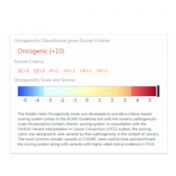This month’s webcast delves into VSWarehouse with a focus on our new capability of storing somatic variant projects and catalogs built for the AMP Guidelines within VSClinical. If you didn’t have a chance to join us for the live event, please enjoy the video recording below. Previous webcasts have gone into great detail on the features and processing of somatic… Read more »
The Golden Helix team is excited to be headed to Baltimore for the AMP 2019 Meeting, and we hope to see you there! You will find our team at booth #2856. Swing by or schedule a time to talk with us one on one about how Golden Helix’s platform is redefining next-gen sequencing analysis. Our team would love to hear… Read more »
VarSeq 2.2.0 was released today and this a stable release full of upgrades and polishes. Some of the newer features include the ability to store and include AMP Cancer assessment catalogs on VSWarehouse, quicker accessibility to common annotations plotted in GenomeBrowse, and the addition of all of our standard templates for the GRCh38 genome assembly. Many of the polishes were… Read more »
The common approaches to detecting copy number variants (CNVs) are chromosomal microarray and MLPA. However, both options increase analysis time, per sample costs, and are limited to the size of CNV events that can be detected. VarSeq’s CNV caller, on the other hand, allows users to detect CNVs from the coverage profile stored in the BAM file, which allows you… Read more »
Before examining the clinical evidence associated with a specific mutation, a clinician must establish that the variant is likely to be a driver mutation which generates functional changes that enhance tumor cell proliferation. Our recent blog series “Following the AMP Guidelines with VSClinical” briefly mentioned how the oncogenicity scoring system in VSClinical could be used to automate and assist the… Read more »
Gene Fusion Background Gene fusions are hybrid genes that result from translocations, interstitial deletions, or chromosomal inversions that can lead to constitutive gene activation and result in increased or abnormal protein production. Increased or abnormal protein production subsequently can play an important role in tumorigenesis and thus identifying and evaluating this type of biomarker is important in the cancer workspace…. Read more »
We have covered a lot of ground in this Automating & Standardizing Your Workflows blog series. First, we saw how to perform secondary analysis with Sentieon to generate the necessary VCF and BAM files for tertiary analysis in Part I. The implementation of VSPipeline allowed for rapid import and project generation for a predefined cancer gene panel project template in… Read more »
VSClinical users can interpret and report genomic mutations in cancer following the AMP guidelines which we’re demonstrating in this “Following the AMP Guidelines with VSClinical” blog series. Part I introduced the hands-on analysis steps involved in creating a high-quality clinical report for targeted Next-Generation Sequencing (NGS) assays. We reviewed sample and variant quality, including the depth of coverage over the target regions by the sequencing performed for each sample. Now, we are ready to… Read more »
In our last part of this series, we showed how to run a pre-built workflow template via VSPipeline to automatically import and filter sample variants to streamline the search for clinically relevant variants. Now, we can deep-dive into our filtered, pathogenic variants to fully understand and capture their final classification and interpretation. Filtered Germline Variants for ACMG Guidelines The VSPipeline… Read more »
VSPipeline: Automating your Tertiary Workflows The first part of this “Automating & Standardizing your NGS Workflow” blog series covered the secondary analysis steps of read alignment and variant calling with Sentieon. The next step is to transition into the tertiary analysis via utilization of our workflow automation tool, VSPipeline. VSPipeline operates as a command-line tool meant to simplify the deployment… Read more »
We are always excited to see how our software is used to support research and enable precision medicine. We believe that our customer’s success is ultimately our success! This summer was filled with many wonderful publications from across the globe and we are proud to have been a part of them. Here are just a few from each month: June… Read more »
In the world of genomics shaping precision medicine in oncology, the limiting factor is the time-to-sign-out of a fully interpreted molecular profile report. There are many components of the entire testing process that add to the turn-around time of each test. Many of these steps, such as sample prep, sequencing, and automated secondary analysis, are bounded and consistent in their time requirements. The hands-on… Read more »
With the increasing knowledge of mutations involved in cancer, it is imperative to have a tertiary analysis pipeline that provides users with the most up to date information on somatic mutations. VSClinical’s Cancer Add-On does just that and more; with this feature, users can investigate and report on SNVs, indels, CNVs, gene fusions, and considerations for wild type genes in… Read more »
As our regular customers may know, we write our blogs to provide relevant content to any NGS-based analysis with VarSeq. Our goal here at Golden Helix is to provide top quality software and guidance on how to use the software efficiently to perform variant analysis. However, this blog series will take a more general perspective and supply some insight into… Read more »
Congenital Myasthenic Syndromes (CMS) History: Congenital Myasthenic Syndromes (CMS) are a group of rare hereditary conditions that can cause seizures, severe muscle weakness, respiratory problems, and potentially disabling weaknesses shortly after birth or early childhood (1). CMS is the result of abnormalities in acetylcholine proteins residing in the motor endplate of the neuromuscular junction (1). These abnormalities can be diagnosed… Read more »
When using VarSeq; annotations, application settings, and assessment catalogs are all stored locally. Sometimes these resources can grow to large space grabbing directories, causing you to either purchase additional storage devices or getting rid of previously downloaded resources you might need down the road. But there’s hope! You can set where you want all of your data stored to be… Read more »
Hypertrophic Cardiomyopathy History It was December 9th, 1989, when one of Loyola Marymount’s strongest inside players, Hank Gathers, collapsed during the middle of a collegiate level basketball game against UC Santa Barbara. Measuring in at 6’7” and weighing 210 pounds, Gathers was diagnosed with exercise-induced ventricular tachycardia, or in layman’s terms, an abnormal heartbeat. Even with the concerning nature of… Read more »
Clinical Variant Analysis for Cancer – Applying AMP Guidelines to Analyze Somatic Variants Detecting cancer at an early stage can make it much more treatable. Developing tests and making them clinically actionable is crucial to beat this disease. This eBook covers the state-of-the-art gene panel tests for cancer. Of course, there is more that can be done. The field is… Read more »
We are upgrading all VSClinical +Cancer Add-On purchases to a 15-months license! One license of VSClinical +AMP Guidelines – $17,995* Additional Users: $8,995* The individualized nature of tumors requires genomic testing for providing the best outcomes for patients. Next-Gen Sequencing enables the detection of small mutations, copy number changes, and common fusions affordably and with high precision. However, the interpretation… Read more »
Clinical Variant Analysis for Cancer – Applying AMP Guidelines to Analyze Somatic Variants As described in my eBook “Genetic Testing for Cancer,” any bioinformatic pipeline for cancer ultimately calls variants based on the aligned reads that the sequencer generated. Variant calling is the process of reviewing a sequence alignment, typically in the form of a BAM file, to identify loci… Read more »











